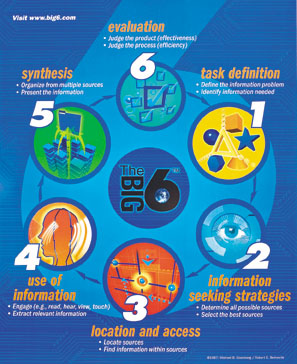
Josh Mika
LRC Director
Beebe Elementary
Naperville, IL 60563
Student Example
App Layering from Josh Mika on Vimeo.
"To be information literate, a person must be able to recognize when information is needed and have the ability to locate, evaluate and use effectively the needed information."
ALA. (1989, January 10). Presidential committee on information literacy: Final report (Publication). Retrieved May 24, 2014, from American Library Association website
|
Asking Questions
Insert comments about research methods (Big 6, etc.)
Google a Day - Digital Research Game
21st Century Information Fluency - Carl Heine, IMSA
MAKE a slide about Koz's Q101 Waste a Half an Hour questions vs. #5 on my car radio's question.
Checkout:
Surface Web: Parts of the internet that can be found via link crawling techniques – meaning it is linked data and can be found via a link from the homepage of a domain; Google can find this data.
Deep Web: Portions of the internet that cannot be accessed by a link crawling search engine like Google. The only way a user can access this portion of the internet is by doing a directed query into web search form to access content within a database that is not linked data. In layman’s terms, a search that is within a particular website.
--summary information from BrightPlanet
http://researchsafari.weebly.com/
--research step by step
http://knowledgecompass.weebly.com/
--knowledge compass
http://big6.com/pages/about/big6-skills-overview.php
--Big Six overview
"The Big6 is an information problem solving process"
--Aligned to the Common Core State Standards
http://www.nypl.org/blog/2013/11/18/research-using-big6-skills-better-grades
--article about "searching like a librarian"
http://www.kyvl.org/kids/homebase.html
--AWESOME graphic about the research process w/ interactive Q&A based off Big 6
Link:
Our ADE online digital research content
Kristi's content

Comments (0)
You don't have permission to comment on this page.